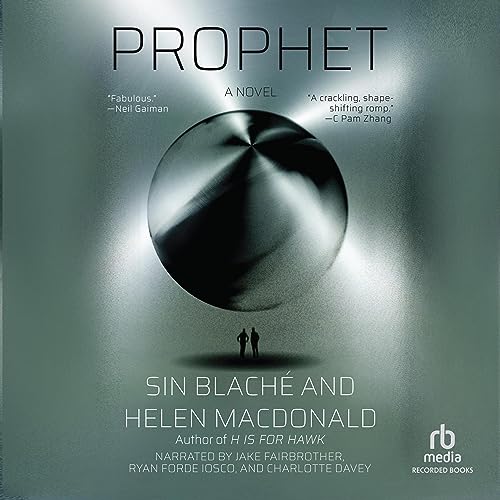 Prophet by Sin Blaché, Helen Macdonald
Prophet by Sin Blaché, Helen Macdonald Narrator: Jake Fairbrother, Ryan Forde Iosco, Charlotte Davey
Format: audiobook, eARC
Source: purchased from Audible, supplied by publisher via Edelweiss
Formats available: hardcover, ebook, audiobook
Genres: espionage, mystery, science fiction, thriller
Pages: 480
Length: 17 hours and 1 minute
Published by Grove Press, Recorded Books on August 8, 2023
Purchasing Info: Author's Website, Publisher's Website, Amazon, Barnes & Noble, Kobo, Bookshop.org, Better World Books
Goodreads
Daring, surprising and superbly plotted, this is a fresh, thrilling page-turner from a dynamic new duo in genre fiction
Your happiest memory is their deadliest weapon.
THIS IS PROPHET.
It knows when you were happiest. It gives life to your fondest memories and uses them to destroy you. But who has created it? And what do they want?
An all-American diner appears overnight in a remote British field. It's brightly lit, warm and inviting but it has no power, no water, no connection to the real world. It's like a memory made flesh - a nostalgic flight of fancy. More and more objects materialise: toys, fairground rides, pets and other treasured mementos of the past.
And the deaths quickly follow.Something is bringing these memories to life, then stifling innocent people with their own joy. This is a weapon like no other. But nobody knows who created it, or why.
Sunil Rao seems a surprising choice of investigator. Chaotic and unpredictable, the former agent is the antithesis of his partner Colonel Adam Rubenstein, the model of a military man. But Sunil has the unique ability to distinguish truth from lies: in objects, words and people, in the past and in real time. And Adam is the only one who truly knows him, after a troubled past together. Now, as they battle this strange new reality, they are drawn closer than ever to defend what they both hold most dear.
For Prophet can weaponise the past. But only love will protect the future.
My Review:
From the opening of Prophet, two things are immediately clear. Sunil Rao and Adam Rubenstein are both FINE, and the situation they are in is already FUBAR.
Whatever is going on – which neither they nor the reader know yet – Adam and Rao are both Fucked-up, Insecure, Neurotic (and) Egotistical (although Rao is way more of the last than Adam) and the world is already Fucked Up Beyond All Recognition. FINE and FUBAR to the max, both of them and all of it.
In other words, they’re both hot messes and not a single thing that happens in Prophet helps either of them get any better.
Pretty much the opposite, in fact.
Calling Sunil Rao a human lie detector isn’t nearly enough of a description. It is TRUE, which matters a lot because that’s what Rao, as he prefers to be called, really does. He can tell when someone or something is true. Which explains why Rao gets called in – and out of a psychiatric institute after a suicide attempt – to the sight of something that so clearly does not belong even as he’s staring at the manifestation of it.
Come to think of it, Rao’s ‘gift’, for lack of a better word, also explains the psych hold, as well as why his work partner/keeper, Lt. Colonel Adam Rubenstein, has been brought in to make sure that Rao doesn’t go off the rails, again, no matter how much the situation they have been dragged into might justify it.
And that’s where both the thriller and the SFnal aspects come into this story. Prophet isn’t a person, there is no one predicting the future. And it’s not ‘profit’, which is what I first thought when I heard the title and hadn’t yet seen it in print.
Although, that’s for select definitions of both of those things, as there is a cabal that intends to make profit on Prophet in the long run, and they do believe that they can control the future with it. They’re oh-so-far off base on both counts.
Prophet is a drug. It’s an attempt to weaponize nostalgia. Which would be one hell of a power IF the side effects could be dealt with. At least the side effects that are a bug and NOT an actual feature. (As we already know because it’s already sorta/kinda happening IRL)
But Prophet isn’t exactly what anyone thought it was, and Rao’s special talent isn’t exactly what anyone has been led to believe, while Adam’s motivations for letting himself get roped into this FUBAR are not what anyone who thinks they are in charge of the whole thing has any reason to have a clue about.
Which leads to this story about finding those clues, the truth about Prophet, who thinks they’re behind it and what actually is. The truth about what Rao can really do. The truth about who Rao and Adam really are. The truth about the relationship between them that they have spent years trying to hide from themselves and each other.
And especially the truth about the nature of the universe, which is not a place that anyone would have predicted this story would go – but is oh-so-utterly fascinating once it gets there.
Escape Rating A+: The thing about Prophet as a story is that it is damn difficult to categorize. It’s kind of like Michael Crichton and Robert Ludlum had a book baby, and as wild and crazy as that thought is the whole thing still needs a lot of midwives and stepparents to get a glimpse at just how much is packed into the story.
But still, that’s a start. (It’s also a clue that any expectations that Prophet will have any resemblance at all to co-author Helen MacDonald’s H is for Hawk are going to be thoroughly disappointed.)
At first it all seems a bit SFnal, of the laboratory school of science fiction – much like Michael Crichton’s Jurassic Park and The Andromeda Strain. Prophet is created in a laboratory, and tested in a more-or-less scientific fashion. Or at least a scientific fashion for scientists who had their ethics surgically removed – which would also be science fiction. (We hope, we really, really do!)
But the way the story works is as a kind of mystery/thriller, particularly of the spy thriller school. Which is interesting because espionage fiction is usually about governments spying on other governments and that’s not what’s happening here. It’s not even, exactly, corporate espionage. Although it’s not exactly not either. (There are a LOT of things in Prophet that are not exactly what they seem but not exactly not what they seem, all at the same time.)
It’s more that Adam and Rao are kind of but not exactly undercover within the organization that is working with Prophet, playing with things they don’t understand, and trying their damndest to figure out what the hell is going on.
Which leads to the mystery. At first it’s the mystery of what created a 1950s era, American-style diner in the middle of the English countryside in a literal instant with someone actually watching the whole time. And what keeps happening to the people who get exposed to Prophet, whether accidentally or on purpose. Mostly on purpose.
Along with the mystery of why Adam Rubenstein is immune and Sunil Rao can safely extract it from people who have been exposed. It’s all a puzzle and a mystery and Adam and Rao become deeply invested in solving it – because they must.
Mixed in with ALL of that, and it’s a lot, is the relationship between Rao and Adam that is, that isn’t, that might be, that can’t be, and that is always more and different than anyone thinks it is. Which includes themselves. And quite possibly, the multiverse.
The inability to figure out what box Prophet falls into will drive some readers bananas. Certainly it gave the reading group that recommended it to me a whole bunch of very mixed reactions because it’s not easily defined. They collectively liked it and were not sure about it at the same time.
What carries the story, and carries the reader through the story, is the ever-evolving, often hidden, always on the verge of heartbreak relationship between Sunil Rao and Adam Rubenstein. They are not who they appear to be – not even to each other. Their histories are both shared and opaque to each other. And they’re both so FINE (in the sense of the acronym) that they are on the edge of mutually assured destruction almost all the time. And yet, they’re always on the same page and always have the same goals, even if it doesn’t seem that way at first, not even to them.
If the reader falls for them and their relationship, and I did, the story is an absolute WOW from beginning to end. An end which still manages to be a bit deus ex machina in spite of the reader being able to see it coming a mile away AND the way that it’s not the deus that saves the day. It’s the machina.
I listened to this one all the way to the end, and the readers were terrific every step of the way, even when they were voicing each other’s characters because the story is told in three, sometimes dueling, first person perspectives. This is the kind of first-person narration I love listening to, because the readers were so good and the story so compelling and the characterization, both in the text and in voice was so very much each of them individually that I really did feel like I was in their heads. Which made for an awesome listening experience.
One of my ongoing frustrations with multiple narrators in audiobooks, as much as I utterly love the style and how much it adds to the storytelling, is that while the list of narrators is credited, it’s seldom detailed into precisely who narrates whom. In this particular production, I believe that Jake Fairbrother ‘played’ Rao and Ryan Forde Iosco took Adam’s part, but I can’t be 100% certain of that in the way that I’m sure that Charlotte Davey voices Veronica, the absolutely psychopathic researcher in charge of Prophet R&D.
To sum things up, Prophet is absolutely bonkers in the best of all possible ways. If you like laboratory-based SF, the implications of the story are fascinating. If you love espionage fiction, especially if you miss it and wonder how those kind of stories are going to be told post-Cold War, this is a fantastic exploration of who might still be spying on whom and why. And if you love a good bromance/buddy thriller, especially one that has the potential for more, Prophet could be your jam across the board, and even better in audio.
It absolutely, positively was mine.

 The Codebreaker's Secret by
The Codebreaker's Secret by  Like the author’s previous work, The Codebreaker’s Secret is primarily set in the author’s home state, Hawai’i, during World War II. And like her other books, this one mixes a touch of romance with a story about both brave and nefarious wartime deeds on a homefront that experienced the war just a bit differently – and considerably closer to home – than did the mainland.
Like the author’s previous work, The Codebreaker’s Secret is primarily set in the author’s home state, Hawai’i, during World War II. And like her other books, this one mixes a touch of romance with a story about both brave and nefarious wartime deeds on a homefront that experienced the war just a bit differently – and considerably closer to home – than did the mainland. Escape Rating A: This is my third book by Sara Ackerman (after
Escape Rating A: This is my third book by Sara Ackerman (after 
 Woman on Fire by
Woman on Fire by 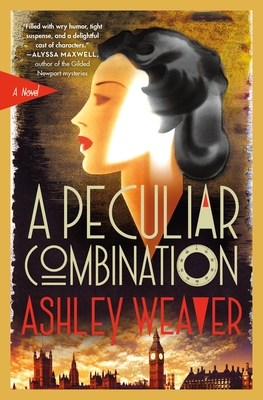 A Peculiar Combination (Electra McDonnell, #1) by
A Peculiar Combination (Electra McDonnell, #1) by 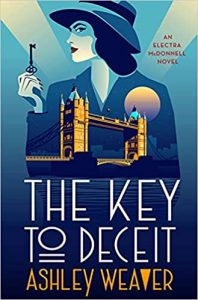 Returning to Major Ramsey, the man with both a stick and his head up his fundament, there is actually a second “peculiar combination” in this story. A romantic triangle – if that’s what it eventually turns out to be as the series progresses. Ramsay may be romantically interested in Ellie – there certainly are hints in that direction. Ellie is at least attracted to Ramsay, as he’s more than handsome enough, but she’s wary of his imperious manner and his upper-crust background. Meanwhile, there’s another man vying for Ellie’s heart, a childhood friend who is, as the saying goes, no better than he ought to be. But then, neither is Ellie. I hope that this conundrum is eventually resolved with as deft a hand as the spy case is wrapped up in this first book in the series, because as much as I’ve loved the adventure and the misdirection so far, I would be even happier with this story without the potentially messy romantic entanglements. YMMV
Returning to Major Ramsey, the man with both a stick and his head up his fundament, there is actually a second “peculiar combination” in this story. A romantic triangle – if that’s what it eventually turns out to be as the series progresses. Ramsay may be romantically interested in Ellie – there certainly are hints in that direction. Ellie is at least attracted to Ramsay, as he’s more than handsome enough, but she’s wary of his imperious manner and his upper-crust background. Meanwhile, there’s another man vying for Ellie’s heart, a childhood friend who is, as the saying goes, no better than he ought to be. But then, neither is Ellie. I hope that this conundrum is eventually resolved with as deft a hand as the spy case is wrapped up in this first book in the series, because as much as I’ve loved the adventure and the misdirection so far, I would be even happier with this story without the potentially messy romantic entanglements. YMMV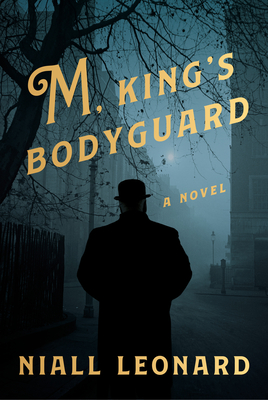 M, King's Bodyguard by
M, King's Bodyguard by 
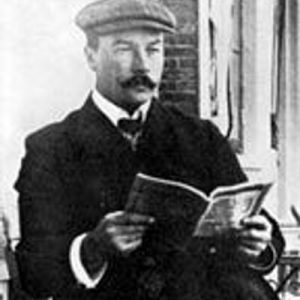
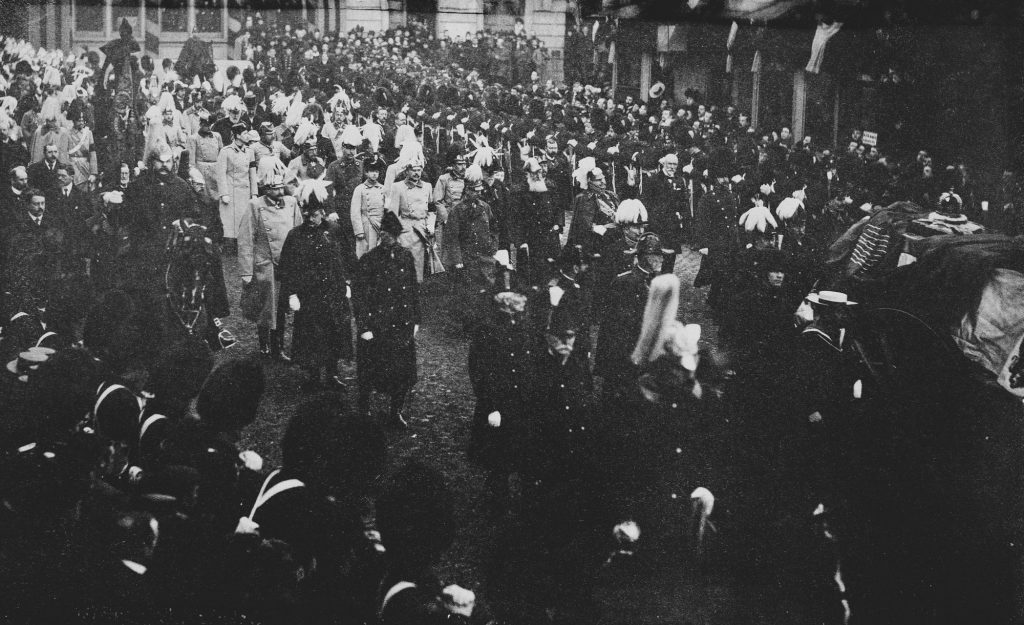
 Slough House (Slough House, #7) by
Slough House (Slough House, #7) by  I suspect that there is a lot more about Jackson Lamb, the denizens of Slough House, the relationship between Slough House and Regent’s Park and the entire setup in the previous books in the series. But I haven’t read them and didn’t feel the lack. I mean, I’m intensely curious about the whole thing but didn’t feel like I was missing anything I needed in order to get firmly stuck into this story.
I suspect that there is a lot more about Jackson Lamb, the denizens of Slough House, the relationship between Slough House and Regent’s Park and the entire setup in the previous books in the series. But I haven’t read them and didn’t feel the lack. I mean, I’m intensely curious about the whole thing but didn’t feel like I was missing anything I needed in order to get firmly stuck into this story. A Tip for the Hangman by
A Tip for the Hangman by 

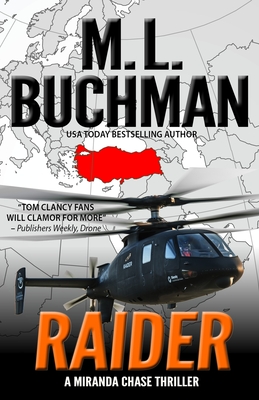 Raider Format:
Raider Format: 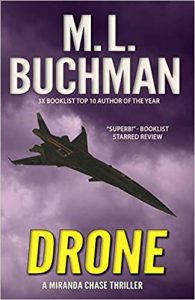 Last but not least, for those who experience an occasional sense of nostalgia for the big, meaty, complicated spy games and government con games of the late Tom Clancy , the Miranda Chase series will definitely remind such readers of the internecine government warfare that was at the heart of so many of Clancy’s best – without the heft. (His later books did get kind of doorstoppy.)
Last but not least, for those who experience an occasional sense of nostalgia for the big, meaty, complicated spy games and government con games of the late Tom Clancy , the Miranda Chase series will definitely remind such readers of the internecine government warfare that was at the heart of so many of Clancy’s best – without the heft. (His later books did get kind of doorstoppy.)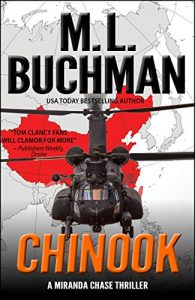 Raider is a spy story. And a military story. A puzzle-solving mystery. It’s Andi’s story. And especially and always it’s Miranda’s story – even if she never sees herself at the center of anything except an investigation.
Raider is a spy story. And a military story. A puzzle-solving mystery. It’s Andi’s story. And especially and always it’s Miranda’s story – even if she never sees herself at the center of anything except an investigation. The Doors of Eden by
The Doors of Eden by  Spy games, cryptids (Sasquatch, Yetis and Loch Ness Monsters, OH MY!) with a nod to Stephen Jay Gould’s
Spy games, cryptids (Sasquatch, Yetis and Loch Ness Monsters, OH MY!) with a nod to Stephen Jay Gould’s  A Question of Betrayal (Elena Standish) by
A Question of Betrayal (Elena Standish) by  Escape Rating A-: My feelings about this book are somewhat paradoxical. On the one hand, I found it even more compelling than the first book. On the other, I feel like I have even less of a grasp of Elena’s character than I did in that first book. So I felt driven to keep turning the pages, but it wasn’t Elena’s story that I was turning those pages for. Definitely a paradox as this is supposed to be Elena’s journey and Elena’s series – or it should be as it is named for her.
Escape Rating A-: My feelings about this book are somewhat paradoxical. On the one hand, I found it even more compelling than the first book. On the other, I feel like I have even less of a grasp of Elena’s character than I did in that first book. So I felt driven to keep turning the pages, but it wasn’t Elena’s story that I was turning those pages for. Definitely a paradox as this is supposed to be Elena’s journey and Elena’s series – or it should be as it is named for her.